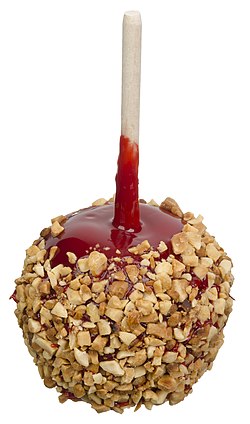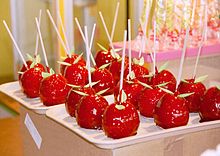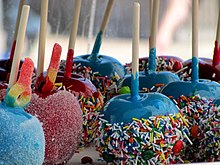 Candy apple coated with red caramel and covered with chopped peanuts Candy apple coated with red caramel and covered with chopped peanuts | |
| Alternative names | Toffee apple |
|---|---|
| Type | Confectionery |
| Place of origin | United States |
| Region or state | New Jersey |
| Created by | William W. Kolb |
| Main ingredients | Apples and sugar candy |
Candy apples (or toffee apples in Commonwealth English) are whole apples covered in a sugar candy coating, with a stick inserted as a handle. These are a common treat at fall festivals in Western culture in the Northern Hemisphere, such as Halloween and Guy Fawkes Night, because these festivals occur in the wake of annual apple harvests. Although candy apples and caramel apples may seem similar, they are made using distinctly different processes.
History
According to one source, American William W. Kolb invented the red candy apple.
Kolb, a veteran Newark candy-maker, produced his first batch of candied apples in 1908. While experimenting in his candy shop with red cinnamon candy for the Christmas trade, he dipped some apples into the mixture and put them in the windows for display. He sold the whole first batch for 5 cents each and later sold thousands yearly. Soon candied apples were being sold along the Jersey Shore, at the circus and in candy shops across the country, according to the Newark News in 1948.
However, toffee apples had previously been recorded as being sold in London in the 1890s.
Ingredients and method
Candy apples are made by coating an apple with a layer of sugar that has been heated to hard crack stage. The most common sugar coating is made from sugar (white or brown), corn syrup, water, cinnamon and red food coloring. Humid weather can prevent the sugar from hardening.
Regional traditions
| This section needs additional citations for verification. Please help improve this article by adding citations to reliable sources in this section. Unsourced material may be challenged and removed. Find sources: "Candy apple" – news · newspapers · books · scholar · JSTOR (October 2020) (Learn how and when to remove this message) |


- Australia – the Granny Smith variety of apple is considered ideal for toffee apples.
- Brazil – candy apples (named as in other Lusophone countries maçã do amor, as in the French pommes d'amour, meaning "apples of love") are common in the festivities in honor of John the Apostle.
- Mainland China – a similar treat called Tanghulu is made by coating small fruits, traditionally hawthorns with hard sugar syrup.
- Canada – very popular and usually eaten at fairs or carnivals.
- France – candy apples are called pommes d'amour (apples of love). They are a common treat found at many festivals.
- Germany – most often associated with Christmas. They are also sometimes sold at carnivals and fairs
- Israel – almost solely sold in cities' squares on Yom Ha'atzmaut eve (Israel Independence Day) as part of the street celebrations.
- Japan – candy apples, grapes, strawberries and tangerines are commonly available at Japanese festivals.
- Republic of Ireland – eaten at Halloween.
- United Kingdom – a similar treat made with toffee is associated with and eaten at Halloween (Scotland and Northern Ireland), or Bonfire Night (England, Scotland and Wales).
- United States – jelly apples, found in New York's Coney Island area, are related but have a soft candy ("jelly") coating and a cherry flavor, not cinnamon.
- Uruguay – Manzanas acarameladas, sold in fairs, zoos and carnivals
- South Africa - toffee apples are mostly available at supermarkets such as Checkers and Spar. They are also very popular throughout apple season. Mostly dipped in red or green coloured sugar syrup.
See also
References
- ThisisSouthDevon (October 9, 2008). "Apples galore as event grows". Torquay Herald Express. Torquay, Devon, UK: localworld.co.uk. Archived from the original on October 3, 2015. Retrieved November 17, 2013.
- Newark Sunday News, November 28, 1948, pg.16. The first candy apples brand was named after Kolb's wife Chelle's. Nowadays, Chelle's Candy Apples is known candy apples, hard candy and other sweet treats. Newark Evening News, June 8, 1964, pg. 32
- "Toffee Apples". The Foods of England Project. Retrieved February 15, 2022.
- Flickety; et al. "How to make Toffee Apples". WikiHow. Archived from the original on March 5, 2014. Retrieved February 17, 2014.
- "Homemade toffee apples recipe | Good Food". www.bbcgoodfood.com. Retrieved December 4, 2024.
- "Caramel Apples vs. Candy Apples. Tart Green Granny Smith apples work very well for making candy apples". St. Petersburg Times. October 24, 2001. Archived from the original on March 3, 2016. Retrieved October 22, 2010.
- "Designer Toffee Apples". Designer Toffee Apples. Archived from the original on February 27, 2015. Retrieved February 17, 2014.
- Celeste Heiter; Things Asian Press (November 1, 2009). To Japan with Love: A Travel Guide for the Connoisseur. ThingsAsian Press. pp. 127–. ISBN 978-1-934159-05-7. Retrieved November 11, 2011.
External links
 Media related to Candy apples at Wikimedia Commons
Media related to Candy apples at Wikimedia Commons